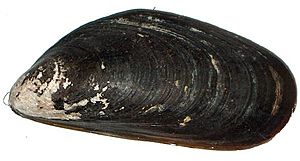Chilean mussel facts for kids
Quick facts for kids Chilean mussel |
|
|---|---|
 |
|
| Scientific classification |
|
| Kingdom: | Animalia |
| Phylum: | Mollusca |
| Class: | Bivalvia |
| Order: | Mytilida |
| Family: | Mytilidae |
| Genus: | Mytilus |
| Species: |
M. platensis
|
| Binomial name | |
| Mytilus platensis d'Orbigny, 1842
|
|
| Script error: The function "autoWithCaption" does not exist. | |
| Synonyms | |
|
Mytilus chilensis
Hupé, 1854 Mytilus desolationis Lamy, 1936 |
|
Script error: No such module "Check for conflicting parameters".
The Chilean mussel or Chilean blue mussel (Mytilus platensis) is a type of blue mussel. These mussels live along the coasts of several South American countries. You can find them in Chile, Argentina, and Uruguay. They also live near the Falkland Islands and the Kerguelen islands. Scientists have sometimes called this mussel by other names, like Southern Mytilus edulis or Mytilus chilensis.
Growing Chilean Mussels
The Chilean mussel is very important for aquaculture in Chile. Aquaculture means farming seafood, like mussels, in controlled environments. It's similar to farming crops on land, but it happens in the water.
In Chile, people grow a lot of M. platensis mussels. Between 2004 and 2008, the amount of mussels harvested each year grew a lot. It went from 80,000 tonnes to 200,000 tonnes. After a small dip in 2009, production quickly went back up in 2010.
Chile also exports many mussels to other countries. In 2008, over 45,000 tonnes of mussels were sent out of Chile. Most of these, about 93%, were frozen. A large part of these exports, about 74%, went to countries in the European Union, especially Spain and France. Another 15% went to the United States.
Mussel Family Tree
Scientists study how different living things are related. This is called systematics. The Chilean mussel, Mytilus platensis, was first described by a scientist named Alcide d’Orbigny in 1842. For a long time, it was better known by another name, Mytilus chilensis.
The Chilean mussel is part of a larger group called the Mytilus edulis complex. This group includes many types of "blue mussels" found around the world. Scientists use special tests to understand how these mussels are related. These tests have shown that the Chilean mussel has features similar to both the Mediterranean mussel (Mytilus galloprovincialis) and the North Atlantic Mytilus edulis.
Because of these similarities, some scientists have suggested different ways to classify the Chilean mussel. Some thought it might be a type of Mediterranean mussel. However, other studies have shown that M. platensis is a native blue mussel species from the Southern Hemisphere. This means it naturally belongs in this part of the world.
See also
 In Spanish: Chorito para niños
In Spanish: Chorito para niños
 | Percy Lavon Julian |
 | Katherine Johnson |
 | George Washington Carver |
 | Annie Easley |

